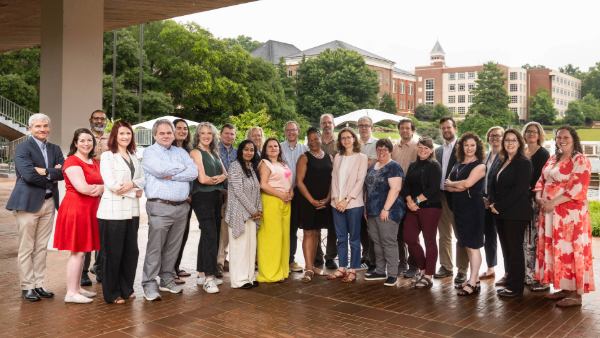It was a brisk September evening that students, faculty, and staff filtered into the Quinlan/Brown Academic Innovation Center’s Innovation Forum to talk about a singular document that’s impacted the lives of Americans for the last 236 years.
“On September 17, 1787, our founding fathers signed the Constitution. Many things were happening in the new country when this system of government was put into place,” Politics, Law, and Society Lecturer Mary Anne K. Clarke told Constitution Day attendees. “In 2024, more is occurring within the United States as we see federal and state issues regarding voting rights, elections, and climate change.”
Clarke, who spearheaded this year’s Constitution Day celebration at Bryant, invited James Madison Memorial Fellowship Foundation chair and former U.S. Senate Officer Laura Dove to moderate a panel discussion with four James Madison fellows on the political relevance of the Constitution today. Over the course of an hour-long discussion, panelists covered everything from what the Constitution teaches people about compromise to ideological clashes that occurred during the Constitution’s creation.
Dedicated to helping people understand the ins and outs of civic engagement, Clarke’s passion for political science extends beyond Bryant’s walls. The College of Arts and Sciences faculty member was recently selected as one of 24 educators across the nation to take part in Clemson University’s Civic Engagement and Voting Rights Teacher Scholars program. Over the course of the 2024-25 academic year, Clarke — alongside peers — will design, create, and disseminate pedagogical materials that aim to improve civic and voter rights education nationwide.
Civic engagement: It’s more than voting
In today’s political climate, Clarke notes that students tend to retrieve their news from headlines and social media, where they latch on to one-line pieces of information and clickbait-type content. In many cases, there’s a persistent mentality that one vote won't make a difference and, therefore, many young adults choose not to vote.
“The election process, what's happening in the community, and what's happening everywhere else matters from the moment people get up in the morning to when they go to bed,” Clarke says.
She notes that many students think civic engagement is just about voting — though the duty stretches well beyond that and encompasses activities that address wider social issues and improve one’s community.

Through the Civic Engagement in Voting Rights Teacher Scholars program, explains Clarke, educators will work in three eight-person groups now through May to create one course syllabi, three assignments, and three in-class activities that aim toward improving civic and voter rights education. The program serves as an avenue for faculty to work together to create classroom teaching materials — by faculty, for faculty — to support a thriving American democracy. The materials will then be available for use in college courses nationwide.
“Civic engagement and citizenship are what I do, so this program was a natural fit,” says Clarke, whose peers were selected across disciplines and come with backgrounds in political science, English, the arts, history, and mathematics, among others. “This was a way that I could not only give back in the classroom but to the community at large.”
From Capitol Hill to higher ed
Clarke’s interest in teaching civic education budded in high school after working as a U.S. Senate page for John H. Chafee on Capitol Hill during the 1980s.
“I originally thought I was going to be a lawyer but, after having first-hand experience of the process, I thought people should really understand how things work,” says the lifelong Rhode Islander.
Since coming to Bryant in 2009, Clarke’s taught everything from “Introduction to Global Politics,” which explores topics such human rights and economic and environmental policies, to “Contemporary Problems and Policy Responses,” where students analyze complex issues and evaluate policy responses with an emphasis on the process of tackling social and political problems. Clarke even developed Bryant’s “Congress and the Policy Making Process” course, which offers a deep dive into America’s legislative body and has students consider the following: Why do some problems in the U.S. make it onto the policy making agenda and others do not? How do problems become policy issues? How do elected officials solve these problems.
RELATED ARTICLE: Working at America's 'hippest cemetery,' alum shares career journey with undergrads
Keeping in touch with students from her early days on campus, Clarke’s had Bryant alums Zoom into her political science courses to share their experiences with undergrads. From Ryan Strik ’19, who serves as the government relations director in Rhode Island for the American Cancer Society Cancer Action Network, to Emily Nunez ’20, who’s a congressional relations specialist for the U.S. Department of Housing and Urban Development, students get a peek at where their degree could take them.
“It's always helpful to hear from a student because they can put themselves in their shoes, and they make connections,” Clarke says.
Continuing the conversation
Back in the Innovation Forum, Constitution Day attendees raise their hands to ask questions about the filibuster, Dove’s experience sitting in on Donald Trump’s first impeachment trial, and Senate officers’ duties.
After 20 minutes of addressing audience inquiries, Dove — who was a Senate page with Clarke in the 1980s — concludes the evening by handing out pocket Constitutions. With another Constitution Day complete, Clarke thanks students for coming — encouraging them to attend upcoming events that cover topics such as the trustworthiness of elections and countering disinformation related to health and politics.
As attendees leave with their miniature but mighty document in hand, they head into the night discussing the event — hopefully bringing what they learned back to their peers. Until next year’s Constitution Day, Clarke will be working on her Civic Engagement in Voting Rights Teacher Scholars program content in hopes of furthering the education of young adults.
“My goal is to come away with more ideas and quality ways to engage students with these topics of civic engagement and voting rights, as well as to have more tools in the classroom to really drive concepts home,” Clarke says.